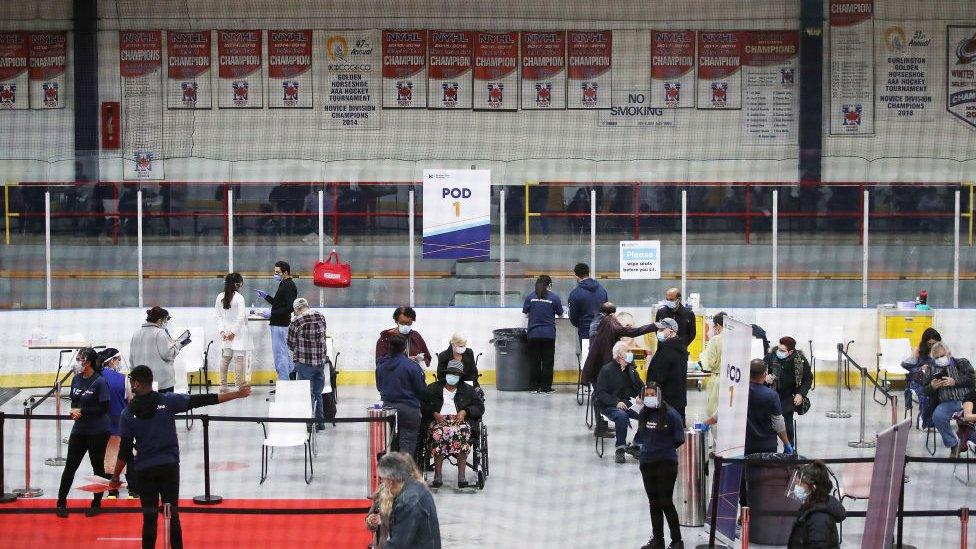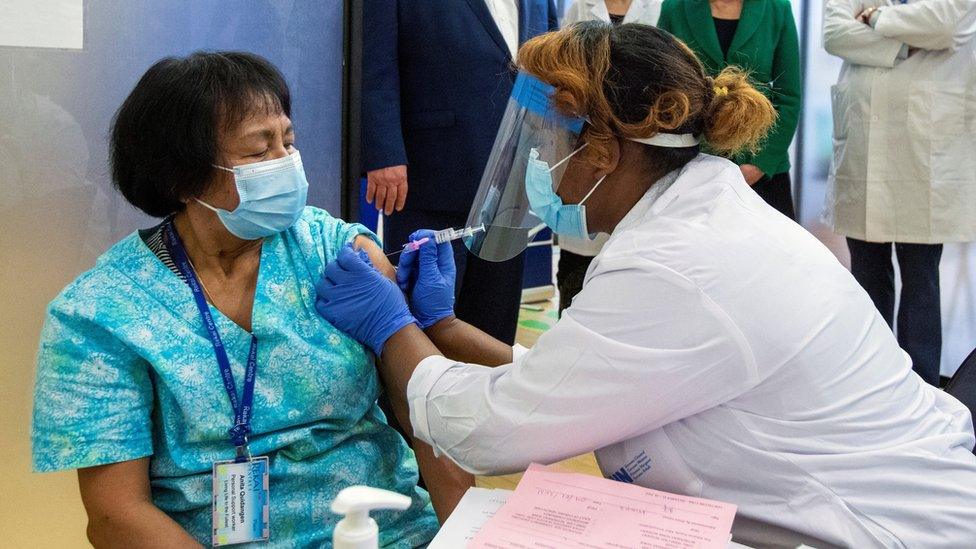Covid infections in Canada edge closer to US rate
- Published

Vaccine is being administered at a hockey arena in Toronto
The rate of Covid infections in Canada is edging close to - and may overtake - US levels for the first time.
It comes as Canada struggles to contain new Covid-19 variants and to ramp up its distribution of vaccines.
Many provinces are bringing in new virus mitigation restrictions as hospital admissions increase.
As of Tuesday, the US had fully vaccinated 19.6% of its population, compared with 8.5% in the UK and 2% in Canada.
"Around the world, countries are facing a very serious third wave of this pandemic," Prime Minister Justin Trudeau warned during a news conference on Tuesday. "And right now, so is Canada."
Canada has recorded more than one million positive cases and 23,000 deaths from Covid-19, according to Johns Hopkins University. Its neighbour to the south, the US, has recorded nearly 31 million cases and over 559,000 deaths from Covid.
Johns Hopkins University data shows that Canada's Covid rate relative to population has risen to 180 cases per one million people as of Tuesday. This means there are around 180 new virus cases, per million residents, each day.

The US is now seeing about 196 Covid cases per one million people, significantly lower than the more than 700 cases per million it was recording in January.
Why are cases in Canada on the rise?
"We've been somewhat blind to our overall performance internationally because we're sitting right next door to the United States and the disaster that clearly was their experience during this pandemic," Ontario Hospital Association president Anthony Dale told the National Post, external.
"They have clearly experienced much worse outcomes overall than Canada, make no mistake. However, it's the future I'm worried about, and we're trending in a worrisome direction in comparison to them when it comes to community spread."
Over 16,000 cases of Covid variants have been recorded across Canada, health officials said on Thursday.

More than 90% of those cases involve the variant first identified in the UK, which now appears to have replaced the original strain of the virus in some areas.
Cases of the Brazil variant have doubled in the past week and there have been nearly 300 cases of the South Africa variant discovered in provinces across the vast country.
The latest data comes as provinces across the country enact new restrictions aimed at stemming the latest surge.
Ontario, the most populous province with 14 million residents, is instituting a strict four-week lockdown, closing all non-essential in-person retail shopping and all Toronto schools starting on Wednesday.
Quebec closed most shopping on 1 April in its three largest cities.
In British Columbia, the Vancouver Canucks NHL hockey team have been forced to postpone upcoming games after an outbreak sickened 25 players and staff.
Can vaccinations help stop the surge?
Canada has secured enough doses to give each citizen 10 vaccinations, but actually getting the jab into people's arms has been going slowly.
According Andrew Morris, a professor of medicine at the University of Toronto, the pace of vaccine rollout has been coming "a little bit too little, too late" to effectively reduce the spread.
The rapid spread of the new variants seem to have caught health officials by surprise, he tells BBC News, noting that in Ontario they are now left "trying to get a pretty uncontrolled situation under control".
"We're not going to be able to vaccinate our way out of this," he warned, adding: "The way to do this is to reduce people interacting."
Related topics
- Published30 March 2021

- Published31 March 2021

- Published18 March 2021

- Published19 February 2021
